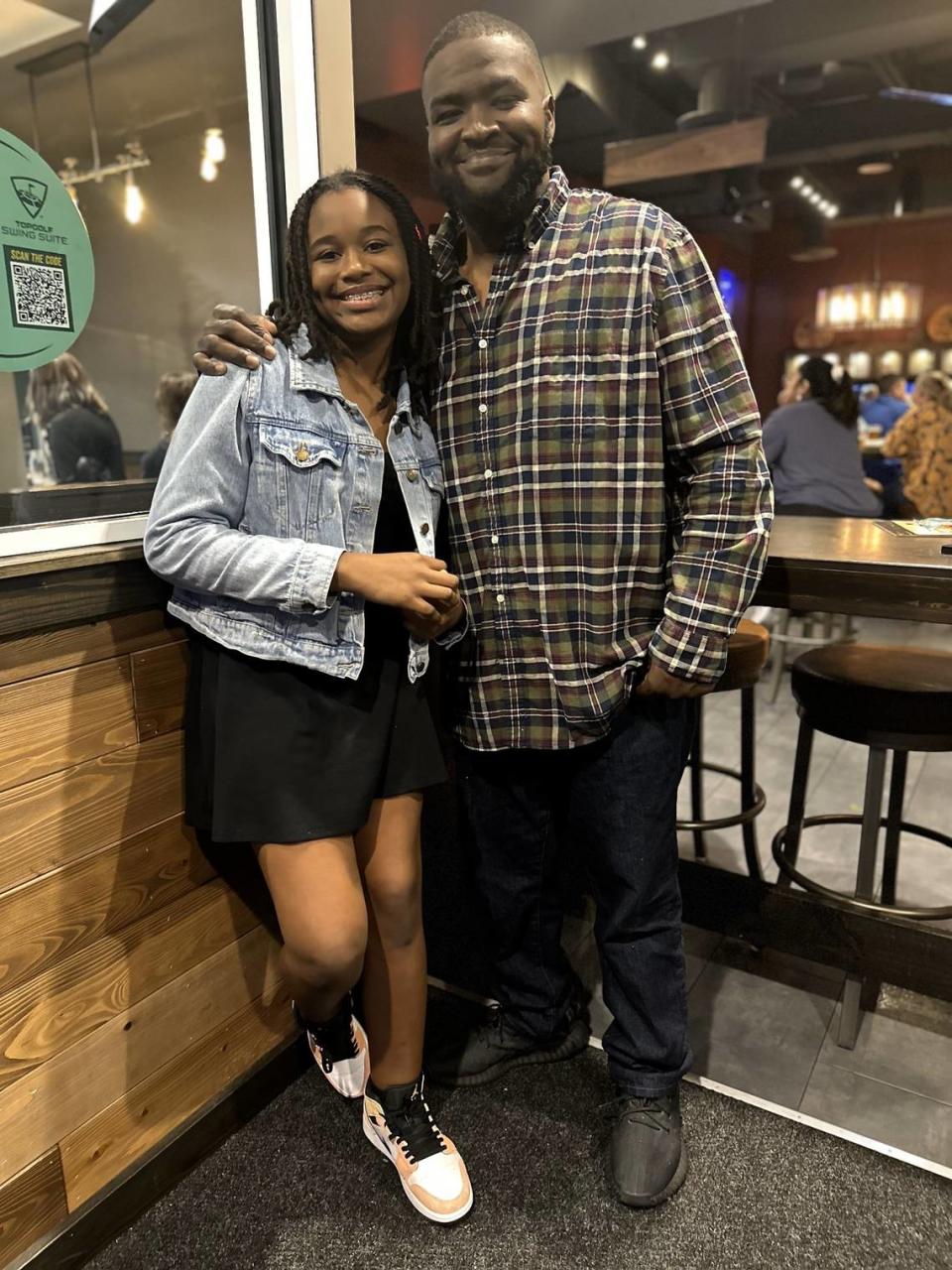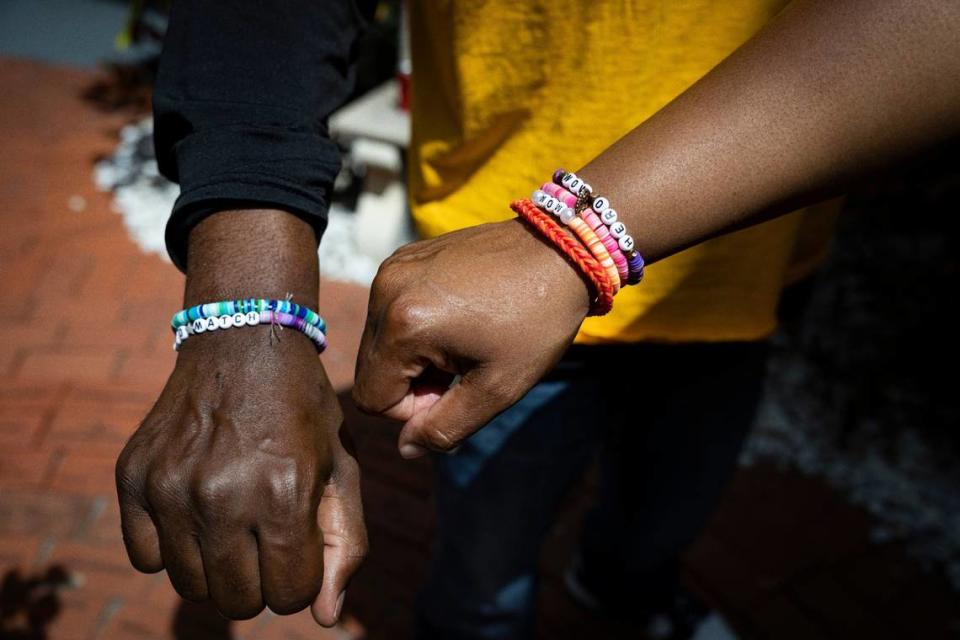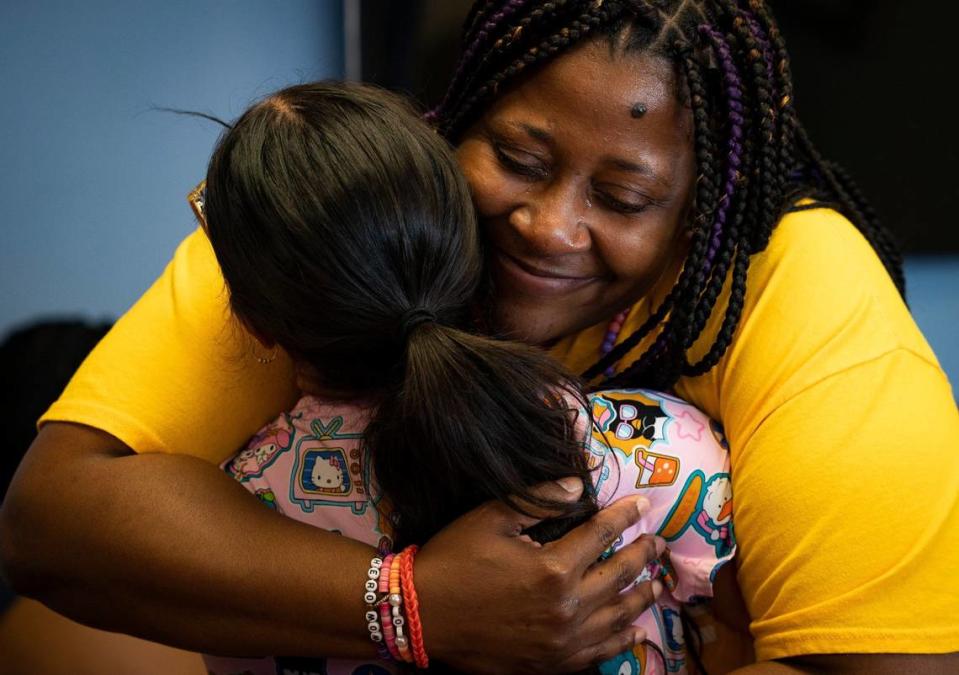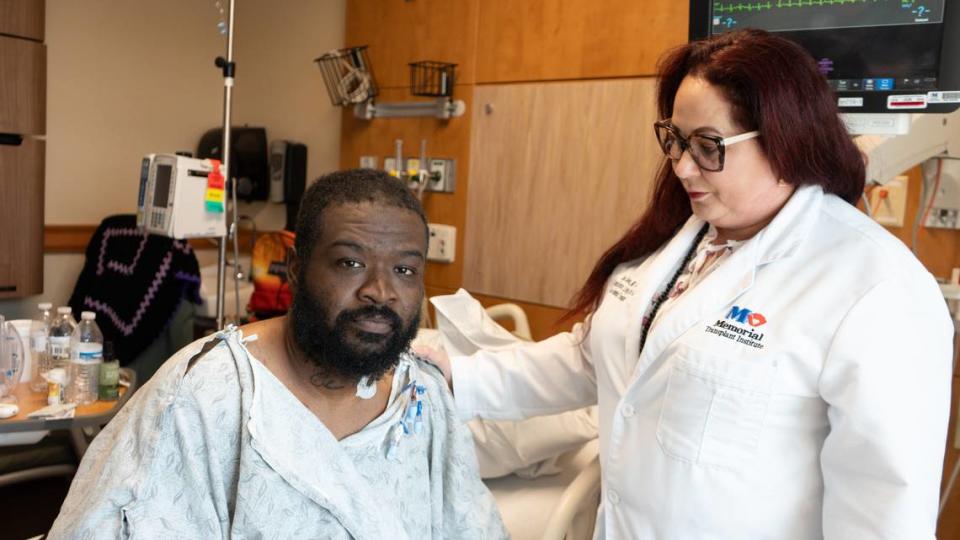How a South Florida girl who died helped save the lives of 5 people, including her dad
Shawn Glenn owes his life to his 13-year-old daughter, Symaria. Her kidney is now his.
Her family says Symaria’s organs helped save the lives of four other people, too, including a young girl.
The South Florida student died in February from a brain bleed. To keep her memory alive, Symaria’s family made her an organ donor.
“She’s going to give life, so she’s going to continue on. Her heartbeat is not going to stop; it’s going to give life to someone else,” said her mom, Dhima Martin, in a video posted on Joe DiMaggio Children Hospital’s Instagram.
Doctors and other workers at the Hollywood hospital lined up in the halls to pay their respects as Symaria’s body was wheeled into surgery for organ recovery. As Symaria passed them, workers threw handwritten notes into a bin, a nod to her love for volleyball. The next day, her father went into surgery for his new kidney.
On Tuesday, Symaria’s parents — wearing yellow shirts with the words “Shine like Symaria” — joined doctors from Memorial Transplant Institute, which performed her father’s surgery, to honor Symaria’s legacy and encourage others to become organ donors.
Her dad said she used to call him “her protector.”
“And now she’s my hero.”
Said her mom: “Her story is going to change the world.”
Remembering Symaria
Symaria was daddy’s princess. He could never say no to her. She was the living example of “light” and love, her mom says, tearing up.
Her parents said Symaria was a performer with a “big personality.” She would memorize monologues and also enjoyed making bracelets. Her favorite color was purple, a hue her mom now has in her hair. She wanted to be an actress.
The seventh-grader also loved volleyball and was planning to try out for her school’s volleyball team, her mom told the Miami Herald in an interview. She had played volleyball the day before she was hospitalized.

Doctors still don’t know what caused the bleeding in her brain. The only sign something was wrong: a headache.
Her family is still processing what happened on Jan. 31, a day that began like any other.
Symaria went to class at Bak Middle School of Arts in the West Palm Beach area, where she was a drama student. Later that night, her mom surprised her with cheesecake for dessert. Dhima was helping Symaria with her homework, when the teen said she had a headache.
“Sleep it off was my first thought,” Dhima said in an interview. Symaria went to rest in her room. But the teen soon told her mom that the headache didn’t feel normal. Alarmed, Dhima began to get ready to take Symaria to see a doctor. When she went back to Symaria’s room, she found her unconscious on the bed.
Panicking, Dhima called 911. Symaria was taken to a nearby hospital and was later airlifted to Joe DiMaggio Children’s Hospital in Hollywood. The hospital’s staff wanted to put the family at ease. They put Symaria in a purple room, her favorite color, and filled the room with photos and Bible verses.
On Feb. 3, Symaria was declared brain dead.

Her parents say it was a difficult decision to donate her organs, and share her journey with the world. They decided it was a way to let Symaria live on and help save others. She donated six organs and has helped five people, including her dad.
Shawn, a registered organ donor, had been on the national kidney transplant list for three years, in search of a new kidney. He never told Symaria or his other kids that he needed a transplant. He was scared they would Google and learn they could donate a kidney to him.
Once Symaria’s parents decided to donate her organs, doctors quickly checked to see if Symaria and her father were a match. Test results showed they were. Medical workers made a bracelet, with the words “Match” spelled in beads to tell him the news, in honor of Symaria and her love for making bracelets.
Now, he will always carry a piece of his little princess with him.
“As I continue to say her name, she continues to live. This is a story that matters,” said Dhima, noting that she’s open to meet the recipients of her daughter’s other organs.
“She wanted to be an actress. So the honor walk was like a red carpet walk for her. Sharing her stories, her moment to be on TV. So she continues on.”
What to know about organ donations
Here are some key facts about organ donations, according to DonateLife America:
▪ More than 100,000 people are waiting for an organ and 86% of them need a kidney.
▪ Every 8 minutes another person is added to the national transplant waiting list.
▪ In the U.S., there were 5,600 people who died in 2022 while waiting for an organ.

What organs can you donate?
▪ One donor can save eight lives and help improve the lives of more than 75 others, according to the U.S. Health Resources and Services Administration.
▪ While most organs are donated after death, there are some organs you can donate fully or partially while alive, according to the federal website.
Organs you can donate while alive: one kidney, one lung, a part of the liver, pancreas and intestine.
Organs you can donate after death: kidneys, liver, lungs, heart, pancreas, intestines, hands and face
▪ There were 170 million people in the U.S. registered as donors in 2022. However, not everyone who registers is eligible to donate. Only 3 in 1,000 people die in a way that makes them eligible for organ donation, according to the federal government.
“That’s why more willing donors are needed,” reads the U.S. Health Resources and Services Administration website.

How to become an organ donor
Floridians who want to become an organ donor can sign up online at DonateLifeFlorida.org.
You can also register to be an organ and tissue donor when you apply for or renew your driver license or ID card at your local driver license office or tax collector’s office. Another option is to contact Donate Life Florida to ask for a registration form to be mailed to you. iPhone users can also use the Health app to register.
If you sign up, make sure to notify your family.

